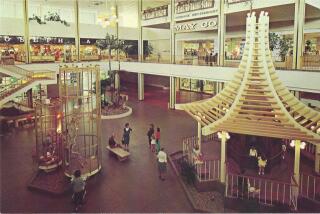A new take on the auto mall
- Share via
YOKOHAMA, JAPAN — Shiny Toyotas are lined up outside the gleaming stores and restaurants at a new Japanese shopping mall. The automaker is trying to cope with a serious problem: Young people in Japan are rapidly losing interest in cars, sending auto sales to 27-year lows.
“We have to go where people congregate,” said Yoichiro Ichimaru, a Toyota Motor Corp. senior managing director who oversees Japan sales. “We need to provide opportunities for people to come in contact with cars.”
The sprawling indoor mall has shopping carts that look like cars, a Toyota robot that plays trumpet and lots of space devoted to Toyota dealerships amid 220 stores and restaurants.
The Tressa mall, inspired by the French word for braiding, tressage, and located southwest of Tokyo in Yokohama, was developed, built and is being run by Toyota.
It was partly opened in December. Reporters got a preview Tuesday, ahead of its formal opening Thursday.
The mall’s main mission is to woo younger Japanese, who Ichimaru said prefer to spend their money on paying their mobile phone bills and on other gadgets.
Sales of new autos in Japan are expected to drop to a 27-year low of 5.3 million vehicles for the fiscal year starting next month, down 0.6%, as demand gets battered by soaring gasoline prices and sluggish wage growth, according to the Japan Automobile Manufacturers Assn.
Although Toyota is seeing overseas sales surge -- a growth so rapid that the company could overtake General Motors Corp. as the world’s No. 1 automaker in global vehicle sales -- its sales in Japan are faltering.
Toyota, which still controls nearly half the Japanese market, sold 2.26 million vehicles in Japan last year, down 4% from the previous year. Toyota’s overseas sales jumped 10% to 7.1 million vehicles.
In Japan, the usual old ways of selling cars, such as using showrooms and TV ads, are no longer working, Toyota officials say.
A study last year by the Nikkei Business Daily found that some people in their 20s said they didn’t want a car, even if they were to receive it for free. Others said they didn’t find the idea of going for a drive with a date or zipping around in a sports car particularly appealing.
Atsushi Kawai, auto analyst at Mizuho Investors Securities Co., believes that manufacturers haven’t done enough to develop cars for the Japanese market, focusing instead on cost cuts and overseas models that sell in numbers.
“Domestic sales are a total disaster now,” he said. “A car used to symbolize a dream. People used to work hard to buy a car. These days, nobody is saying that. No one thinks a car is cool anymore.”
Other social factors, including Japan’s declining population, are also behind the sales decline.
Japan has excellent public transportation, including trains and subways. Parking is often expensive, with many apartment buildings charging $100 a month. Many young people aren’t even bothering to get a driver’s license, which is an expensive and time-consuming endeavor in Japan. And traffic can be congested.
Toyota President Katsuaki Watanabe has suggested that basic changes in Japanese society, including better driving conditions, would be needed to reverse the drop in auto sales here.
Other Japanese automakers are also working to boost domestic sales.
Last year, Nissan Motor Co. set up a recording company to have popular bands produce original tunes that were TV ad jingles for Nissan models but were also sold as CDs and online music downloads.
Nissan also set up a shopping Web page featuring cute mascot-like items and developed cars with special features and marketing campaigns to target young women.
Perking interest in vehicles is growing so difficult that Toyota believes it’s worth it to run a mall to coax buyers to consider buying a car or trade in their wheels for a new model.
Toyota Automall Development Corp., a Toyota subsidiary set up in 1999, already runs one shopping mall in central Japan near Toyota’s headquarters.
Atsushi Komatsuki, president of Toyota Automall Development, declined to say how much Toyota has invested in the new mall, but said the mall is generating solid profit, targeting 11 million visitors a year.
He refused to say how many cars the mall’s dealers had sold since its partial opening in December.
Yumiko Iwasaki, 15, said she enjoys coming to the mall to buy clothes, eat ice cream cones and meet her friends, but never stops to look at any of the cars on display because she has no interest in them.
“Maybe when I get really old I’ll think about buying a car,” she said.
Mieko Yabe, shopping for clothes with her baby at Tressa, said that the mall is convenient because she lives in the neighborhood, but that owning a Toyota wasn’t in her future.
“We have absolutely no interest in Japanese cars. My husband drives a BMW,” the 35-year-old housewife said.






